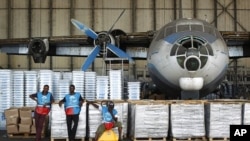Electoral officials in the Democratic Republic of Congo say they are ready for Monday's presidential and legislative voting in a country the size of Western Europe with more than 63,000 polling stations.
The Independent National Electoral Commission says all voting materials have been distributed to regional headquarters and will be delivered to individual polling places before the start of voting Monday morning.
Commission Vice President Jacques Djoli Eseng'Ekeli says training for poll workers is complete and everything is ready for the vote on the 28. He says ballots and ballot boxes will be delivered by helicopter in more remote areas.
Once vote counting is complete, Eseng'Ekeli says each party representative in each polling place will receive a copy of the vote totals before that document is scanned and sent electronically to electoral commission headquarters in Kinshasa to help prevent fraud.
There are more than 18,000 people running for 500 seats in the national assembly. Ten candidates are challenging President Joseph Kabila.
Most political observers believe Kabila will win re-election, in part because much of the opposition vote will be split between three candidates. There is no second round of balloting, so whoever gets the most votes Monday wins.
Former rebel leader Jean-Pierre Bemba is calling on Kabila opponents to unite behind a single candidate. Bemba lost a violence-riddled run-off vote against Mr. Kabila five years ago, and his party holds the most opposition seats in parliament.
But he is not running this time because he is on trial for war crimes at the International Criminal Court in the Hague. Thomas Luhaka is the secretary general of Bemba's party.
Reading Bemba's statement, Luhaka says it is not yet too late to save the country if the Congolese people, in unanimity, choose a single candidate who would have the best chance of changing the country.
In these last days of campaigning, it might be too late for the leading opposition candidates - Etienne Tshisekedi, Vital Kamerhe and Leon Kengo wa Dondo - to forge a united front against the president, who is officially running as an independent candidate with ruling-party support.
Kabila Prime Minister Adolphe Muzito says the president deserves a second term because he is leading a fight against neo-colonialism.
Prime Minister Muzito says President Kabila's election in 2006 began the rise of the country out of oppression and exploitation by bringing about economic stability and the creation of an army that serves the Congolese people instead of attacking them.
President Kabila came to power in 2001 following the assassination of his father, Laurent Kabila, who led the rebellion against the dictator Mobutu Sese Seko when this country was called Zaire.
Electoral Officials Say DRC Ready for Elections




